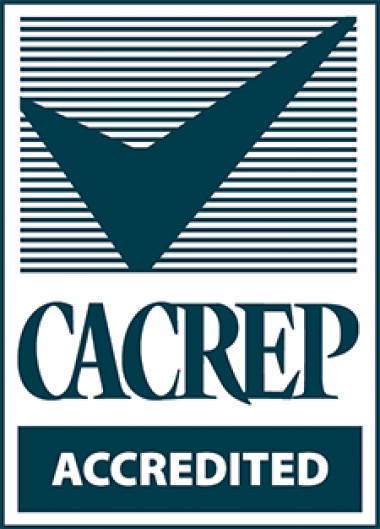Clinical Rehabilitation Counseling Specialization
The Clinical Rehabilitation Counseling specialization (CLRC) is fully accredited by the Council for Accreditation of Counseling & Related Educational Programs through October 31, 2024.
This specialization prepares graduates for meeting the requirements for the Licensed Associate Counselor (LAC) and Licensed Professional Counselor (LPC) in Arizona and other states. It also qualifies them for professional certification as Certified Rehabilitation Counselor (CRC). When students pass the Certified Rehabilitation Counselor Examination (CRCE), they are immediately eligible for CRC credential and the LAC.
It is the specialized training in the ethics of integrative care, rehabilitation, and the complex connections between physical and mental health, including the role of trauma and social determinants of health that provides the skills required to provide diverse services such as psychotherapy and mental health counseling, vocational counseling and forensic assessment. Graduates serve individuals with emotional, developmental, and cognitive disabilities so they can achieve their personal, career, and independent living goals in the most integrated setting possible.
Graduate students take the same core courses as the Clinical Mental Health (CMH) specialization. The additional courses in disability, habilitation, and rehabilitation mean additional expertise and insight during service delivery.
- SERP 565 Introduction to Rehabilitation and Mental Health Counseling (3 credits)
- SERP 585 Career and Vocational Planning (3 credits)
- SERP 587 Lifespan Development and Disability (3 credits)
- SERP 594 Practicum - Rehabilitation Specialty (3 credits)
Graduates are eligible for the LAC and then the LPC licenses in Arizona and other states when they pass the Certified Rehabilitation Counselor Examination (CRCE) - The same license used by mental health counselors to provide psychotherapy and mental health counseling. The CRCE examination is written into the LAC/LPC licensure law in Arizona, which allows graduates to immediate licensure eligibility.
Graduates qualify for advanced training in areas such as motivational interviewing and trauma-informed care as well as doctoral degrees such as the Counselor Education and Supervision (CES) doctorate at The University of Arizona.
Rehabilitation counseling is a dynamic specialization of the broader profession of counseling. With expertise around disability and rehabilitation, rehabilitation counselors (RCs) may seem to practice within a more restricted or specialized range of clients than do other types of counselors because of their focus on disability. Nothing could be further from the truth.
Individuals with disabilities are one of the fastest growing minority groups in the U.S. RCs specialize in serving an ever-expanding population of individuals with disabilities, including physical (e.g., spinal cord injury, epilepsy), sensory (e.g., blindness, deafness), developmental (e.g., intellectual, autism), cognitive (e.g., traumatic brain injury, learning disability), emotional (e.g., depression, anxiety, schizophrenia, substance abuse), or chronic illness (e.g., cancer, diabetes). It is also the case that persons with disabilities may experience two or more types of disabilities or have co-occurring disabilities that would require knowledge of each disability and interactive effects on the person’s experience and functioning. The experience of disability is as unique as humans are, and RCs provide services to individuals across the lifespan, including children, adolescents, young adults, and older adults. Therefore, RCs must understand disability from a developmental perspective, considering variation due to client experience and the ecological context.
RCs are employed in social service settings like community mental health centers; self-employed or employed in private practice settings, especially forensic rehabilitation; inpatient treatment facilities; nursing homes and other care home settings; and academic clinical settings. RCs provide advocacy, emergency mental health services, trauma therapy, family support; and provide vocational services to veterans within the Veterans Administration system.
RC work differs from other counseling specializations because of its broad scope of practice. When a client has a disability, several concerns intersect to produce other concerns.
EXAMPLE: Mary was in a car accident that resulted in a traumatic brain injury. To live independently, Mary must relearn walking, talking, and eating among other skills. An RC would assist Mary in a manner that supports her as a whole person - mental health, physical health, family support. This is not to say other clinical professionals are not thorough. Rather, an RC’s goal is not just Mary’s brain injury. The goal includes methods by which Mary can empower herself to achieve personal, professional, and independent living goals despite challenges.
An RC would incorporate and prioritize the following as part of a service plan that targets social, emotional, physical, and occupational needs:
- Provide case management services
- Connect Mary with physical therapy, occupational therapy, and/or speech therapy
- Provide mental health counseling services to work through the trauma of the accident
- Offer services to Mary’s family – psychoeducation on Mary’s conditions, resources to help Mary recover to the greatest extent possible
- Explore community, educational, or occupational programs that facilitate Mary’s community reintegration to the highest degree possible.
The answer depends on your goals and personality. The Clinical Rehabilitation Counseling specialization is a good choice if you are looking for a broad scope of practice that includes psychotherapy and mental health counseling as well as an integrative care focus on social determinants of health.


